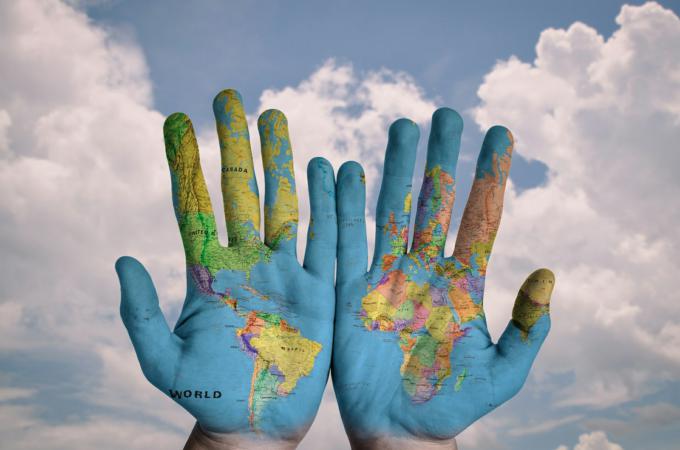Catholics and Buddhists -- solidarity on climate change
On the 50th anniversary of Earth Day, The World Parliament of Religions offered a webinar featuring Catholic-Buddhist Dialogue on Solidarity and Engagement on Climate Change. Featuring two Catholic and two Buddhist scholars, the April 23 event was co-sponsored by the Earth Day Network, Catholic Climate Covenant, the Society for Buddhist-Christian Studies, and the Catholic Association of Diocesan Ecumenical and Interreligious Officers.
Father Leo Lefebure, a priest of the Archdiocese of Chicago and Matteo Ricci professor at Georgetown University in Washington, D.C., noted that Francis of Assisi praised God in and through all the different creatures, as well as through water, air, and fire. Thus, it was no surprise that Pope Francis turned to St. Francis for inspiration in his encyclical "Laudato Si'," in which he underlines the interconnectedness of everything in God's creation.
However, Father Lefebure observed, we're living in a throw-away culture, and the effect on the earth is devastating. Access to water, for example, is a right of all creatures. Yet today, we pollute our bodies of water. Profit and efficiency are the values by which we tend to measure everything. In the Catholic world, there are numerous movements that do not appreciate Pope Francis' ecological emphasis. Thus, within the Catholic world, said Father Lefebure, it's kind of a divided house. The message has not yet been universally received.
In response, a Buddhist within the Shingon tradition of Japanese Buddhism, David Lloyd, shared that while Buddhism, like Christianity, is not a single unified tradition, its various traditions/ denominations do share core values.
With respect to our environment, Lloyd agreed that we need a collective awakening to stop the present course of destruction. And the way to do this, he said, is to challenge our preoccupation with consumption and ongoing economic growth. "For us today," Lloyd remarked, "the earth has become a means to an end, something we use for short-sighted purposes in ways that are making it and us sick."
Buddhism emphasizes interdependence, said Lloyd. "Within the Buddhist tradition, we should want to awaken ourselves not just for our own benefit, but for the well-being of everyone, and become concerned about the negative things happening to others due to climate change."
Sister Kathleen Deignan, a professor of Religious and Environmental Studies in New Rochelle, New York, said that "if there is a blessing in our planetary crisis for our religious traditions, it is an 'end-game awareness.' We are talking about devastation of our planetary home. We are communities that need to be cultivators of a new planetary civilization."
"We need to not only address the crisis," Sister Kathleen said, "but assume our rightful place as community leaders and guides, motivating our communities in their corporate nature to bring the transformation that needs to happen into realization. We need to bring the sacred back into science."
Dekila Chungyalpa, a Tibetan Buddhist practitioner from the Himalayas, founder and director of Sacred Earth and teacher at the University of Wisconsin, asserted that the impact of climate change in the Himalayas is significant because people there don't have access to a lot of health services. She observed that the last three popes have spoken clearly about climate change and its effects, and inquired, "What is the obstacle that blocks us from absorbing these perspectives? We are obviously attached to our way of life. But science is also a search for truth as religion is."
The essence of the Buddha's teaching, Dekila observed, is to live with compassion for all living beings. "There are now 50 monasteries across the Himalayas working to protect the environment. Social and environmental issues are now seen as interconnected. Where do we go from here? I trust the younger generation has energy and interest to give to this."
David added that "I've been disappointed with Buddhism in the U.S. Most Buddhist converts still seem to think of social engagement as a distraction from the personal transformation sought through meditation. This social and ecological response is kind of new territory for Buddhists in America."
Father Lefebure noted that a lot of Catholics are not yet "on board" as well. And when world leaders come together as they are doing in the Parliament of the World's Religions and speak with a common voice, that it is an energizing resource.
Sister Kathleen declared that action is going to be required. "Retreats and spirituality programs are articulating these values. Catholic institutions are amending their mission statements to integrate into them these environmental commitments. We need to see this finding expression as well in preaching, teaching, and catechesis. In short, we need to take such teachings and bring them to life in concrete living."
- Kevin and Marilyn Ryan, editors of "Why I'm Still a Catholic," worship at St. Lawrence Church in Brookline, Mass.



















